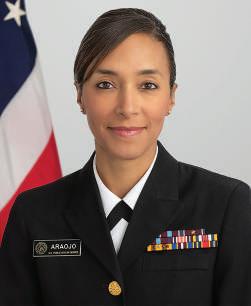
9 minute read
Cultural Ambassadors and COVID-19 Outreach
RADM Richardae Araojo Associate Commissioner for Minority Health and Director of the Office of Minority Health and Health Equity (OMHHE) in the Office of the Commissioner at the U.S. Food and Drug Administration (FDA)
In this role, RADM Araojo provides leadership, oversight, and direction on minority health and health disparity matters for the Agency. The Office of Minority Health and Health Equity aims to promote and protect the health of diverse populations through research and communication of regulatory science that addresses health disparities. RADM Araojo previously served as the Director of the Office of Medical Policy Initiatives (OMPI) in FDA’s Center for Drug Evaluation and Research (CDER), where she managed the OMPI’s immediate office and three divisions. She led a variety of broadbased medical and clinical policy initiatives to improve the science and efficiency of clinical trials and enhance professional and patient labeling. RADM Araojo worked collaboratively with other FDA disciplines, program areas, and FDA centers to foster an interdisciplinary approach to policy development and to enhance the integration of the continuingly evolving science and policy into FDA’s drug development and regulatory review processes. She provided oversight and direction for cross-cutting center and Agency working groups, as well as collaborations with external constituents, to advance medical policy development. RADM Araojo joined FDA in 2003, where she held a number of positions in CDER’s Office of New Drugs, first serving in the Division of Psychiatry Drug Products (formerly the Division of Neuropharmacological Drug Products) and then with the Pediatric and Maternal Health Staff (currently the Division of Pediatric and Maternal Health). She then transitioned to the Office of Medical Policy in 2010, where she served as Acting Director of the Division of Medical Policy Programs, Deputy Director of OMPI, and finally Director of OMPI.
Advertisement
RADM Araojo received her Doctor of Pharmacy Degree from Virginia Commonwealth University, completed a Pharmacy Practice Residency with an emphasis in Community Ambulatory Care at the University of Maryland, and later earned a Master’s degree in Pharmacy Regulation and Policy from the University of Florida.
Office of Minority Health & Health Equity
FDA’s Office of Minority Health and Health Equity (OMHHE) commemorates 10 years of working towards creating a world where health equity is a reality for all. For the past decade, OMHHE has made tremendous progress in raising awareness around chronic diseases, addressing clinical trial diversity, supporting research projects that answer specific minority health concerns, and training a diverse workforce through our various fellowship programs. The U.S. population is growing increasingly diverse and ensuring meaningful representation of racial and ethnic minorities in clinical trials for regulated medical products is fundamental not only to the FDA’s regulatory mission, but also public health. However, racial and ethnic minorities continue to be underrepresented in clinical trials and remain disproportionately burdened by many chronic and debilitating diseases. Because clinical trials provide a crucial base of evidence for evaluating whether a medical product is safe and effective, enrollment in clinical trials should reflect the diversity of the population that is ultimately going to use the product. It is important for clinical trial participants to reflect the diversity of the population that is going to use the product so that sub-population data can be appropriately analyzed, and more meaningful clinical data can be communicated to the public. The FDA Office of Minority Health and Health Equity and the Yale School of Medicine/Yale Center for Clinical Investigation (YCCI) have partnered to increase participation of diverse and historically underrepresented or underserved populations in clinical research.

This past year’s Innovation and Diversity Summit was the second in our planned series as a part of our MOU and focused on the importance of historically underrepresented racial or ethnic minorities in clinical research. Our goal is to bring stakeholders from the governmental agencies, industry, academia, and community to provoke discussion about innovation and clinical trial diversity and raise awareness. This past year’s event was special as we were also celebrating the 10th anniversary and accomplishments of both the FDA Office of Minority Health and Health Equity and the Yale Cultural Ambassadors Program, which is a partnership between Yale, Junta for Progressive Action, and the Connecticut African Methodist Episcopal (AME) Zion Churches to promote clinical research education and diverse participation in clinical trials. Representatives of AME Zion Church, one of the nation’s oldest African American denominations, are serving as Cultural Ambassadors to Yale’s research programs, advising investigators how best to raise awareness of clinical research. YCCI provides Cultural Ambassadors with intensive training on clinical research topics so that they are able to answer your questions about participating in research. It is our hope that this collaboration will increase the participation of African Americans. Our goal is to bring medical advances to patients who need them.
Reverend Clayton is a co-founder of the Yale Cultural Ambassadors Program, launched more than ten years ago with a mission to catalyze the sustainable advancement of patient diversity, equity, and inclusion in clinical research.
Reverend Clayton is a native of Waterbury Connecticut, where he attended the local schools and graduated from W. F. Kaynor Regional Technical Vocational School. Reverend Clayton worked in the automotive refinishing business for 25 years. He began his pastoral vocation in 1983, after years of a passionate pursuit of music that included playing in church. He matriculated at Slidell and Hartford Seminaries and completed his Clinical Pastoral Education (CPE) at Hartford Hospital. He was the Pastor of Redeemers Church in Plainville for 18 years and is now the Pastor of Walter’s Memorial AME Zion Church, Bridgeport, CT.
Reverend Clayton became a Cultural Ambassador so that he could help raise awareness of the importance of clinical trials for his community. The program has taught him the importance of diversity among clinical trial participants to include people of different ethnic backgrounds, as well as women and children. He said that YCCI brochures and pamphlets on clinical research have been helpful in generating discussions about different diseases and have led to talk about cancer, diabetes, and research in general.
Reverend Elvin Clayton, Walters Memorial AME Zion Church, Bridgeport and Cultural Ambassador to the Yale Clinical Research program
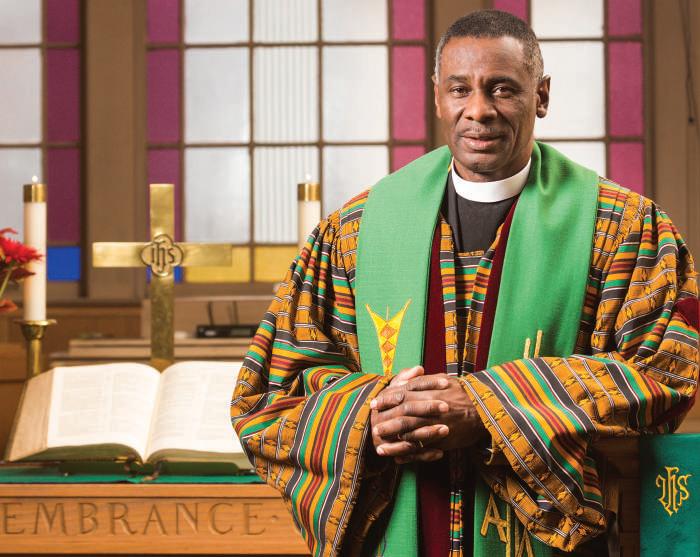
“The program has helped to dispel the myths that clinical research means being a guinea pig. It is also helping to inform my community that everyone needs to participate in research.” – Rev. Clayton
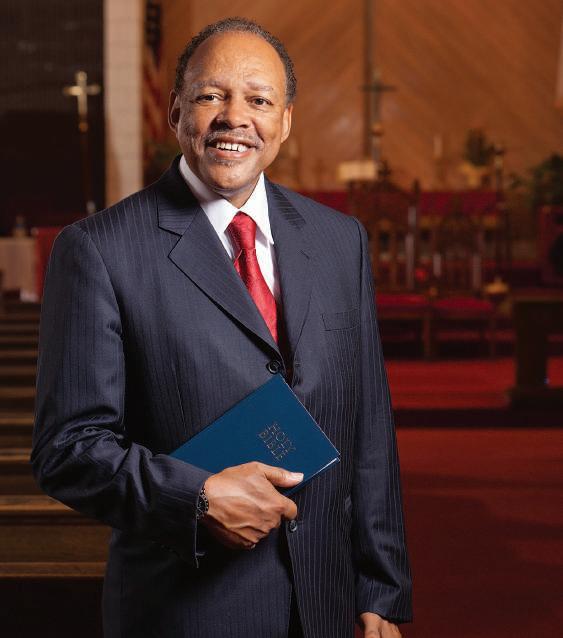
Reverend Dr. Leroy O. Perry, Jr., St. Stephens AME Zion Church, Branford and Cultural Ambassador to the Yale Clinical Research program Reverend Dr. Leroy O. Perry, Jr. is a co-founder of the Yale Cultural Ambassadors Program, launched more than ten years ago with a mission to catalyze the sustainable advancement of patient diversity, equity, and inclusion in clinical research. The Reverend Dr. Perry is the Pastor of St. Stephens AME Zion Church. He earned his BA from Livingstone College, his MDiv from Yale Divinity, and STM and doctoral degree from New York Theological Seminary in New York City. He served on Mayor O’Leary’s commission for diversity study for the City of Waterbury, and as chairman of the Clergy Support committee for Waterbury Opportunities Industrialization Center, where he worked to foster Black economic development in the area. Presently he servers as the director of the Fatherhood Program at New Opportunities in Waterbury, CT. Although he was aware of health care disparities before becoming a Cultural Ambassador, he was not aware of the clinical research conducted at Yale. Like many African Americans of his generation, there was a historical stigma dating back to the Tuskegee Study that stymied his interest in clinical research. He was pleased to discover that YCCI wanted to establish a partnership with the community that is built on an informed and clear definition of policies, procedures, and practices regarding clinical research. He is now an Ambassador for YCCI and serves as an advocate within the African American community in particular and the larger minority communities in general. He feels the partnership with Yale is a valuable learning exchange and a necessary adhesive needed to bridge an effective community relationship for the advancement of clinical research.
Reverend Kelsey M. Hopson is a native of Earlington, KY. He received a BA in Business Administration with Management Specialization from Kentucky State University and was conferred the Master of Divinity Degree with Specialization in Wesleyan Studies from St. Paul School of Theology in Leawood, Kansas. Reverend Hopson served as pastor in Kentucky for 8 years and Kansas City, MO for 7 ½ years before being appointed to the historic Mt. Olive AME Zion Church (the oldest Black institution in Waterbury) in Waterbury, CT in 2018 where he currently serves. Pastor Hopson also serves as the CEO of the Mt. Olive AME Zion Senior Citizens Center Inc.
Reverend Hopson became a Cultural Ambassador in order to learn more about clinical research and to be part of an institution and mission that strives to make a qualitative difference in people’s lives. “Since becoming a Cultural Ambassador, I’ve been amazed by the quality and practicality of the information provided through the training and presentations alone. I believe communities need access to reliable and practical information that empowers people to take up agency for their health and the well-being of others. Partnering with the Yale Clinical Research program provides invaluable opportunities for me to better serve the Senior Center, congregants, community, and beyond.” Reverend Kelcy Steele is a native of Rock Hill, SC and began his college education at York Technical College. He graduated from Belmont Abby, in Belmont, NC with a Bachelor of Arts Degree in Religion & Psychology. Pastor Steele was awarded a Certificate from Emory University for completing the course From Freedom Rides to Ferguson: Narratives of Nonviolence in the American Civil Rights Movement. He studied an array of theological courses at Shaw University Divinity School, and earned his Masters of Divinity at United Theological Seminary in Dayton, OH. Pastoral assignments for Pastor Steele have included Morning Star Church, Charlotte, NC; New Loves Chapel AME Zion Church, Lake Wylie, SC and Bethel AME Zion Church, Kannapolis, NC. He is an inductee of the 2015 World Methodist Council Order of The FLAME and a sought-after evangelist, revivalist, and workshop facilitator. Pastor Steele is the author of the book “The Sound of Revival” Exploring Prophetic Preaching in the Wesleyan Tradition. In September 2016, Pastor Steele was appointed by Bishop Dennis V. Proctor to Varick Memorial AME Zion Church, New Haven, CT as the 43rd Pastor. Pastor Steele is presently serving the New Haven Community in the following capacities – CEO of the Varick Center for Empowerment; Imani Breakthrough Project Leader, Founder of the Connecticut Social Justice Collaborative, founding member of the CT Equity Now (CTEN), the Chair of the Board of Directors for Booker T. Washington Academy; an affiliate member of New Haven Rising; the Director of Evangelism for the New England Conference; Dean of the Hartford District Studies; Cultural Ambassador of Yale Center for Clinical Investigation; a Board Member for Bridges of Hope; and was appointed by the Governor Ned Lamont to the Connecticut Board of Pardons and Paroles.
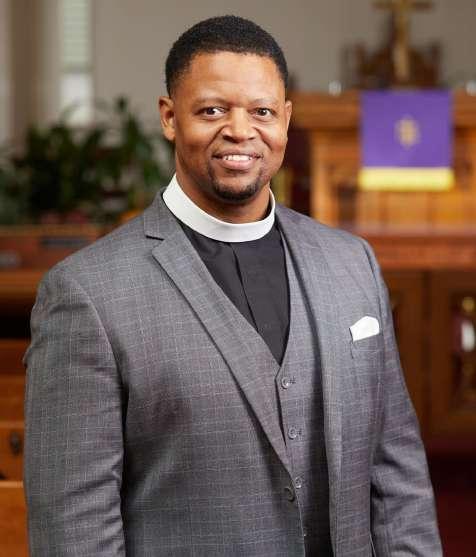
Reverend Kelcy Steele, Pastor, Varick Memorial AME Zion Church and Cultural Ambassador to the Yale Clinical Research program
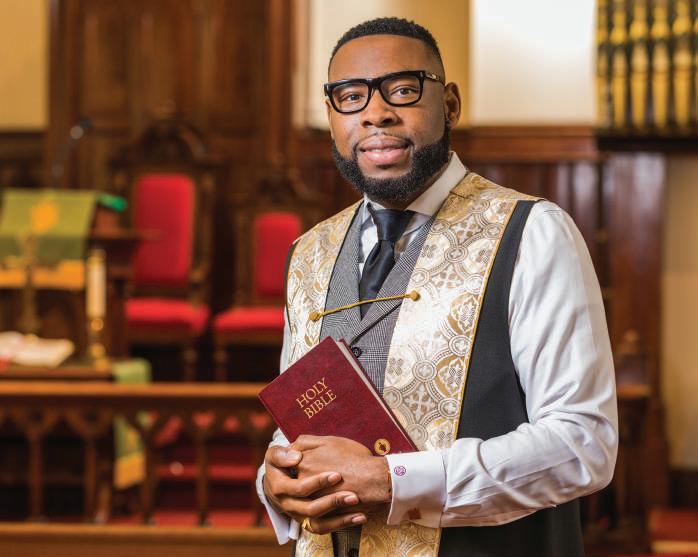
and beyond.” – Rev. Hopson






